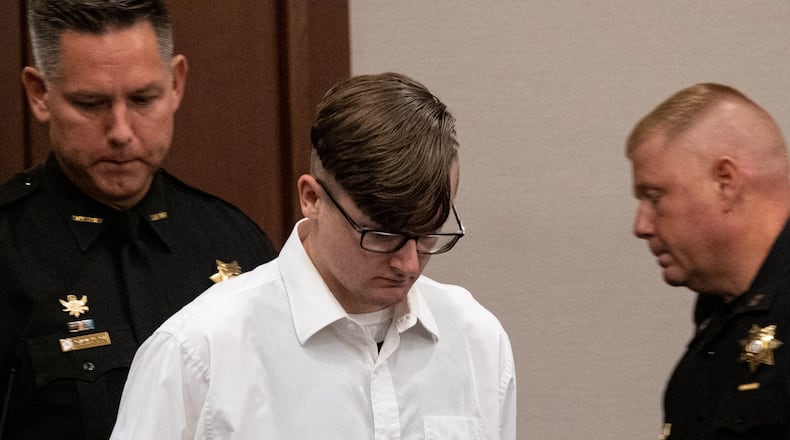A mass killer’s plea deal in Cherokee County won’t change the Fulton County top prosecutor’s plans to seek the death penalty and hate crime charges.
And according to an attorney representing some of the eight victims in the March shooting spree at three Atlanta spas, the cases are different and should be prosecuted that way.
“While it’s intertwined, it’s distinctively different than the Fulton County case,” attorney BJay Pak told The Atlanta Journal-Constitution on Wednesday.
The Cherokee case was closed with a plea deal and the assurance the killer will spend the rest of his life in prison, a move that victims’ families wanted. By avoiding a trial, District Attorney Shannon Wallace could not pursue the death penalty, nor add charges under the hate crime law, enacted in Georgia last summer.
But in Fulton County, District Attorney Fani Willis says the victims’ families are willing to wait for a trial and a possible death sentence.
Willis said she is confident her team has enough evidence to convict 22-year-old Robert Aaron Long of not only murder in the deaths of four Asian women at two Atlanta spas, but also of hate crimes. Willis said the families of the four victims agree with her.
“I spent 10 hours with the victims’ families. I’m completely confident they support me in this,” Willis said. “I think these victims deserve a thorough examination of what happened and why it happened.”
Willis reaffirmed her plans after Long took a plea deal Tuesday in Cherokee, accepting four life sentences, plus 35 years, without the possibility of parole for four murders and more than a dozen other charges. Wallace said Tuesday that she’d planned to pursue the death penalty had the case against Long gone to trial. Additionally, prosecutors were prepared to argue that Long committed a hate crime when he targeted women.
But Wallace said she honored the wishes of the Cherokee County victims’ families and the survivors, who wanted swift justice rather than enduring a trial. Additionally, despite an extensive investigation by the FBI and Cherokee prosecutors, there was not enough evidence to prove beyond a reasonable doubt that Long’s actions were racially motivated, she said.
Of the four people killed in Cherokee, two were Asian women. In Atlanta, all four women were Asian, which may help Fulton prosecutors convince a jury that the acts were hate crimes.
If there’d been a trial in Cherokee, Wallace said she would have argued that Long targeted women. But even if Long had been convicted of a hate crime, it wouldn’t have changed his sentence, she said Tuesday.
Georgia’s hate crime law offers sentencing guidelines for anyone convicted of targeting a victim based on race, color, religion, national origin, sex, sexual orientation, gender, mental disability or physical disability. But one Atlanta attorney, not involved in the cases against Long, said the law will likely be applied differently across the state and there’s no precedent for how it will be applied.
“The amount of discretion a prosecutor has is vast,” said Atlanta attorney Jessica Cino. “In some jurisdictions, there won’t be any pressure to push for hate crimes. I think that’s what you saw (in Cherokee).”
On March 16, Long went on a killing spree at three metro Atlanta spas, according to police and prosecutors. After paying for a service at Young’s Asian Massage near Acworth, Long pulled out his new gun and killed four people and critically injured a fifth. Xiaojie “Emily” Tan, 49; Daoyou Feng, 44; Delaina Yaun, 33; and Paul Michels, 54, were killed. Elcias Hernandez-Ortiz was injured.
From there, Long drove to Atlanta, where he killed four others at two spas on Piedmont Road, according to police. Those victims were Yong Ae Yue, 63; Soon Chung Park, 74; Suncha Kim, 69; and Hyun Jung Grant, 51.
Credit: Christina Matacotta
Credit: Christina Matacotta
Long was arrested later that night and charged with eight counts of murder: four counts in Cherokee and four in Fulton.
Pak, a Korean American lawyer who represents the families of Yue and Kim, said he applauded Wallace for pursuing what the Cherokee County victims’ families wanted. Although some in the Asian community were disappointed with that sentencing, Pak said it was a tough punishment.
“Life without parole, consecutive sentences plus 35 years is not a slap in the face,” he said. “That’s a major sentence.”
But Willis would face considerable blowback if she didn’t pursue hate crimes enhancements against Long, Cino said. The Georgia law is broad, Cino noted, and if not applied to the race of the victims, it could easily be applied to gender.
“He’s certainly made some admissible statements about how he views women that would appear to meet the threshold (for hate crimes),” Cino said.
She also said the U.S. Justice Department’s decision not to file hate crimes charges should not be viewed under the same lens. “The legal threshold is much higher for the feds,” Cino said.
It could take at least two years for a death penalty case to come to trial. Pak said a different racial makeup of the Fulton victims could help prosecutors.
“My clients want justice and they are behind the DA’s decision,” he said.
Though Willis filed paperwork in May to seek the death penalty, only one Georgia jury has handed down a death sentence during the past seven years. That occurred in April 2019 when a Gwinnett County jury sentenced Tiffany Moss to die by lethal injection for starving her 10-year-old stepdaughter, then trying to burn the child’s corpse inside a trash can. In that case, Moss represented herself as her own lawyer and put up no defense.
WHAT’S NEXT
Wednesday: Robert Aaron Long was transported to the Fulton County jail.
Aug. 23: He is scheduled to be arraigned, the first time he’s appeared in a Fulton court. He’s charged with four counts of murder in the March 16 shootings at two spas on Piedmont Avenue, along with aggravated assault, domestic terrorism and possession of a weapon during the commission of a felony. District Attorney Fani Willis said she will seek hate crime charges and the death penalty.
Keep Reading
The Latest
Featured





